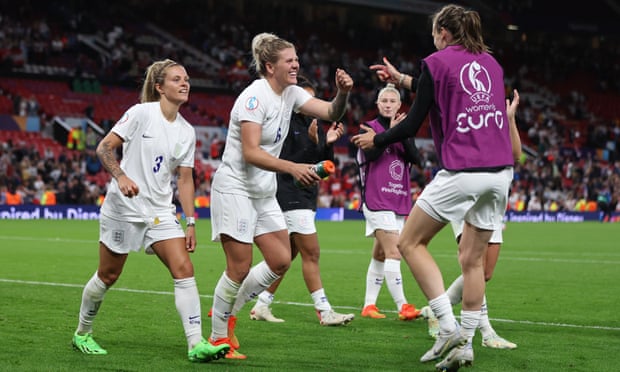Ideal central defender Millie Bright the cornerstone of England’s Euros tilt
Millie Bright can be complimented on many things but perhaps the biggest indicator of the England defender’s sometimes underrated talent is her habit of forming apparently perfect partnerships with fellow centre-halves.
After establishing herself as an international regular in 2017 Bright often made it look as if she and the Lionesses’ former captain Steph Houghton had been a double act since childhood. More recently, she has appeared completely at home alongside Alex Greenwood and Leah Williamson.
As Sarina Wiegman’s side kicked off their Euro 2022 campaign with a 1-0 victory over Austria at Old Trafford on Wednesday night, it was Bright who calmed the initial nerves of the captain, Williamson. In the course of a performance big on important blocks and interceptions, deft dribbles out of defensive tight spots and some eye-catching long diagonal passes, she looked very much the senior partner.
So much so that, at 28, Bright could almost be the ideal central defender. An amalgam of powerful tackling, strong aerial presence, imposing physicality, a highly incisive passing range and an ability to score the odd spectacular goal, she has become very much the cornerstone of Wiegman’s side.
Playing alongside Sweden’s outstanding captain, Magdalena Eriksson, at Chelsea can only have accelerated her development, and she has also benefited from Emma Hayes’s stellar coaching and the WSL champions’ periodic switching between a back three and back four.
Hayes has regularly reiterated that she believes Bright to be among the world’s top individuals in her position. “She’s got presence, leadership and few players have a work ethic to match Millie’s,” says Chelsea’s manager. “She’s improved year on year.”

Bright ended up playing every England game in that tournament en route to a semi-final exit and would subsequently prove equally vital to Sampson’s successor, Phil Neville. Wiegman’s views on certain aspects of the game diverge from Neville’s but they appear to agree on the importance of a Yorkshirewoman who, unusually, was not formally coached until well into her teens.
Until she joined Sheffield United’s academy, before a stint with Doncaster Belles, Bright had looked set to pursue an equestrian career. Having first sat on a horse at the age of two she progressed to compete in dressage and showjumping at county level and, after leaving school, worked as a groom for a leading dressage rider in South Yorkshire for a time.
By then, though, Bright was playing football part-time. The game eventually won the heart and mind of a woman whose robust appearance belies the fact that she learned to overcome adversity after regular spells in hospital with childhood asthma.
Such is her value to England and Chelsea that Bright is no longer allowed to ride her family’s horses and will postpone a long-awaited return to the saddle until she hangs up her boots. In the meantime she has emerged as such a consistent study in poise under pressure that no Euro 2022 opponent dare underestimate her talent.
As Rachel Brown-Finnis, the former England goalkeeper, once put it: “If you were trying to build a centre-half to sell in the shops or to have on the PlayStation, Millie Bright would be your ideal model.”
Subscribe To Our Newsletter
-
How to get a free jersey
- How to get Pcs free jerseys Feedback Customer Reviews About Us Contact Us News FAQ
-
User Center
- Forget Password My Orders Tracking Order My Account Register
-
Payment & Shipping
- Customs & Taxes Locations We Ship To Shipping Methods Payment Methods
-
Company Policies
- Return Policy Privacy Policy Terms of Use Infringement Policy

